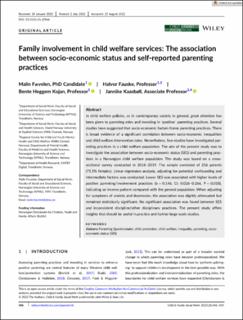| dc.contributor.author | Fævelen, Malin | |
| dc.contributor.author | Fauske, Halvor | |
| dc.contributor.author | Kojan, Bente Heggem | |
| dc.contributor.author | Kaasbøll, Jannike | |
| dc.coverage.spatial | Norway | en_US |
| dc.date.accessioned | 2023-04-14T12:19:39Z | |
| dc.date.available | 2023-04-14T12:19:39Z | |
| dc.date.created | 2022-08-25T23:15:07Z | |
| dc.date.issued | 2022-08-25 | |
| dc.identifier.citation | Child & Family Social Work. 2022, . | en_US |
| dc.identifier.issn | 1356-7500 | |
| dc.identifier.uri | https://hdl.handle.net/11250/3063131 | |
| dc.description.abstract | Abstract: In child welfare policies, as in contemporary society in general, great attention has been given to parenting roles and investing in ‘positive’ parenting practices. Several studies have suggested that socio-economic factors frame parenting practices. There is broad evidence of a significant correlation between socio-economic inequalities and child welfare intervention rates. Nevertheless, few studies have investigated parenting practices in a child welfare population. The aim of the present study was to investigate the association between socio-economic status (SES) and parenting practices in a Norwegian child welfare population. The study was based on a crosssectional survey conducted in 2018–2019. The sample consisted of 256 parents (71.5% females). Linear regression analysis, adjusting for potential confounding and intermediate factors, was conducted. Lower SES was associated with higher levels of positive parenting/involvement practices (b = 0.146, CI: 0.026–0.266, P = 0.018), indicating an inverse pattern compared with the general population. When adjusting for symptoms of anxiety and depression, the association was slightly attenuated but remained statistically significant. No significant association was found between SES and inconsistent discipline/other disciplinary practices. The present study offers insights that should be useful in practice and further large-scale studies. | en_US |
| dc.language.iso | eng | en_US |
| dc.rights | Navngivelse 4.0 Internasjonal | * |
| dc.rights.uri | http://creativecommons.org/licenses/by/4.0/deed.no | * |
| dc.subject | Alabama Parenting | en_US |
| dc.subject | Questionnaire | en_US |
| dc.subject | child protection | en_US |
| dc.subject | child welfare | en_US |
| dc.subject | inequality | en_US |
| dc.subject | parenting | en_US |
| dc.subject | socioeconomic status (SES) | en_US |
| dc.title | Family involvement in child welfare services: The association between socio-economic status and self-reported parenting practices | en_US |
| dc.title.alternative | Family involvement in child welfare services: The association between socio-economic status and self-reported parenting practices | en_US |
| dc.type | Peer reviewed | en_US |
| dc.type | Journal article | en_US |
| dc.description.version | publishedVersion | en_US |
| dc.subject.nsi | VDP::Samfunnsvitenskap: 200 | en_US |
| dc.source.pagenumber | 346-359 | en_US |
| dc.source.volume | 28 | en_US |
| dc.source.journal | Child & Family Social Work | en_US |
| dc.identifier.doi | 10.1111/cfs.12966 | |
| dc.identifier.cristin | 2046177 | |
| dc.relation.project | Norges forskningsråd: 273607 | en_US |
| cristin.ispublished | true | |
| cristin.fulltext | original | |
| cristin.qualitycode | 2 | |

